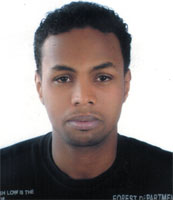
A Yemeni soccer player’s appeal to get back his dignity [Archives:2008/1131/Reportage]
February 21 2008
 |
In an exclusive interview with the Yemen Times, Yemeni soccer player Mohammed Ahmed Al-Sanfi reveals that, due to his skin color, he suffers discrimination and social stigmatization, which have damaged his playing concentration and negatively impacted his social status here in Yemen.
Taking a deep breath, Al-Sanfi began, “My story began when my father, Ahmed Mswaud Al-Sanfi, died in 2001 and I discovered that the woman who raised me wasn't my biological mother.
“It was difficult to accept the fact that the woman who raised me for nearly 12 years as one of her eight children wasn't my real mother, although all of my official papers – including my birth certificate, my father's family certificate, my identification card and my high school diploma – all indicate that she's my mother and Ahmed Al-Sanfi is my father,” Al-Sanfi noted, showing the papers as proof of this.
“However, that wasn't the real shock. The real shock was when her kind maternal attitude toward me completely changed after my father's death. She hated me, verbally attacked me, tried to kick me out of the house and, worst of all, she refused to even acknowledge me, to the extent that they dropped my name from father's will!”
Likewise, the 18-year-old told how his neighbors' attitude toward him also changed after learning of his family's rejection.
He continued, “Before my father died, people had hinted that I was different, always implying that I was black and my brothers are white. However, they never dared talk about it until after my father's death and when my stepmother and my brothers refused to acknowledge me. Their rejection of me set tongues wagging.”
Al-Sanfi claims that his neighbors are circulating rumors suggesting that he's illegitimate – a bastard – and not a Yemeni, which hurts him deeply, causing him to avoid others and isolate himself from any type of social activity.
“I walk the streets feeling ashamed and unable to lift my head to face those in my neighborhood. Even at my job at the Electricity Ministry, I try not to be social because if my coworkers came to my neighborhood to visit me, they'd hear these rumors and look down on me,” Al-Sanfi explained.
Such rumors not only have affected his social status, but also his career as a soccer player. “Until recently, playing soccer was my only release from the pain and suffering caused by these rumors,” he said.
“Once, I was at the airport with my teammates going to play a match outside Sana'a and the official who took my passport asked me, 'Are you Mohammed Al-Sanfi?' When I answered affirmatively, he began asking me personal questions in front of the other players, referring to the same rumors. I don't know how he heard those stories, but I'll never forget the embarrassing and awful feelings I experienced during that time,” he recalled.
Having played on the youth soccer team, the national team and many other local teams – always wearing jersey number 23 – Al-Sanfi now has stopped going to the soccer field, even ceasing to participate in team practice matches . “I haven't played soccer in six months,” he admitted.
Why he revealed his painful story
“I recently heard that I have an uncle (the brother of my real mother) living in Europe. I didn't even know I had an uncle until one day, an old man came up to me at the mosque, telling me that my uncle had been trying to contact my father before his death. He claims that my uncle is the only one with information about my mother and who can prove that I'm the legal son of Ahmed Al-Sanfi,” he recounted.
The young player knows he was born in Dhamar and that his mother worked at a United Nations agency when his father married her; however, Al-Sanfi doesn't know her name, why she left him or the name of the agency for which she worked. He also doesn't know in which European country his uncle lives, but he's heard that his uncle's name is Abdulrabb Slamat Tsfy Hili .and that he is of Somali descent.
“I came to the Yemen Times because – at the suggestion of the old man I met at the mosque – my uncle may read this interview and recognize my picture. I hope he'll contact me if he learns what I'm going through,” Al-Sanafi appealed.
“I have nothing to lose. I realize that publishing such personal information may lead some people to misunderstand me or perhaps criticize me more, especially my brothers and sisters,” he continued.
“I'm not sure how this interview will impact my career, but I can't live in isolation anymore, nor can I accept the discrimination to which I'm subjected. I want to know who I am and I want to know my mother, but most importantly, I want my dignity back,” Al-Sanafi concluded.
——
[archive-e:1131-v:15-y:2008-d:2008-02-21-p:report]


